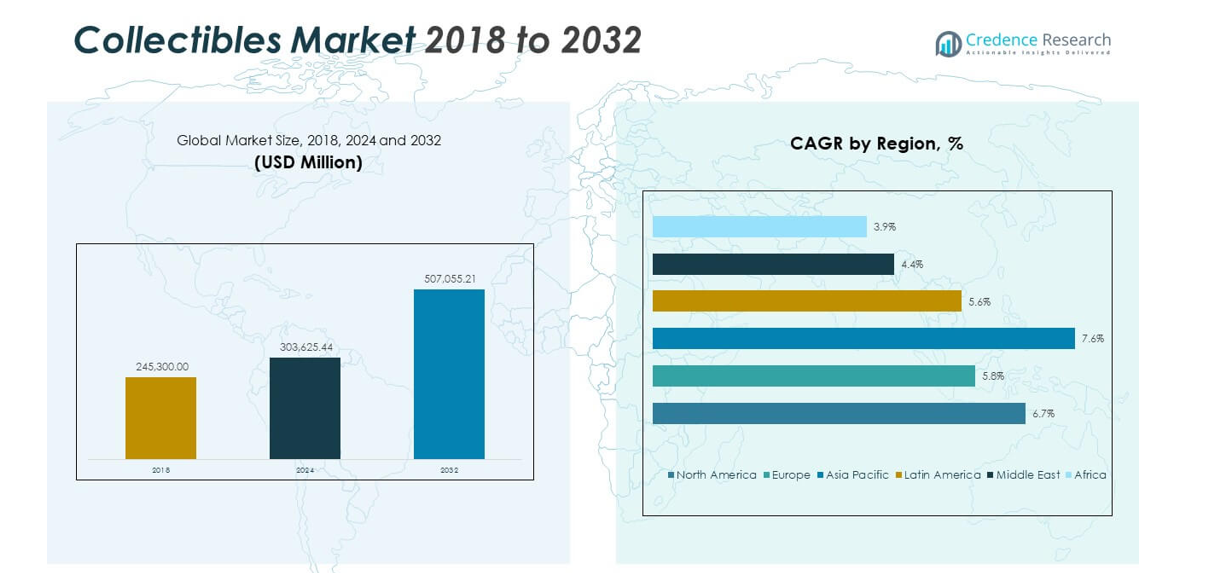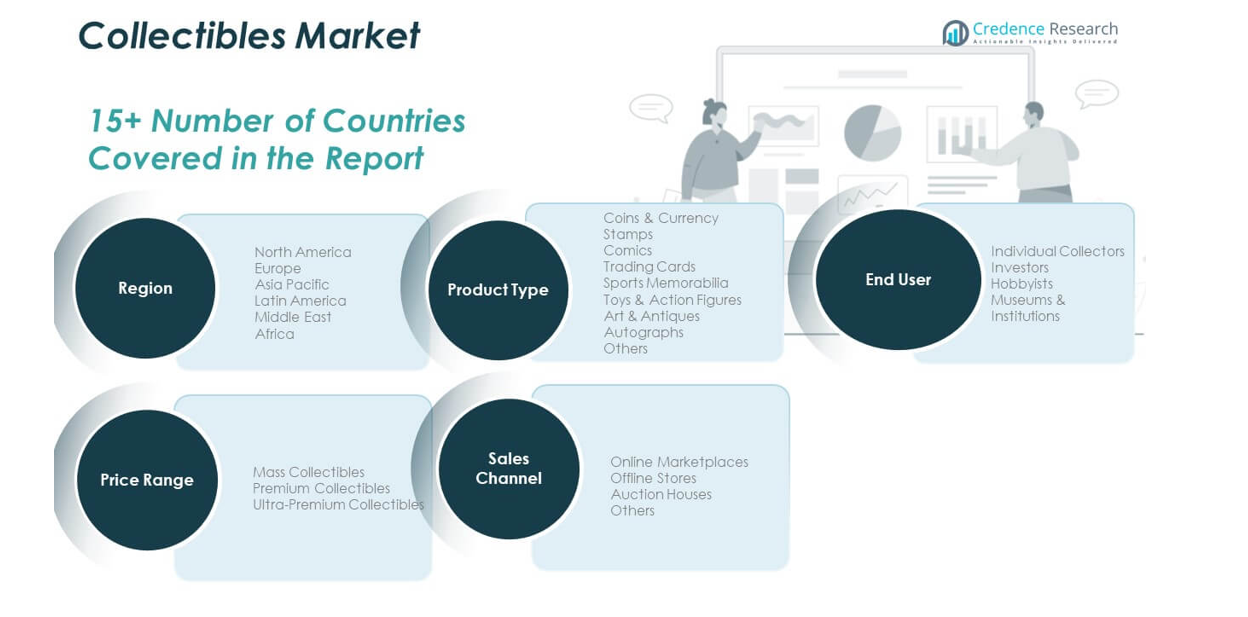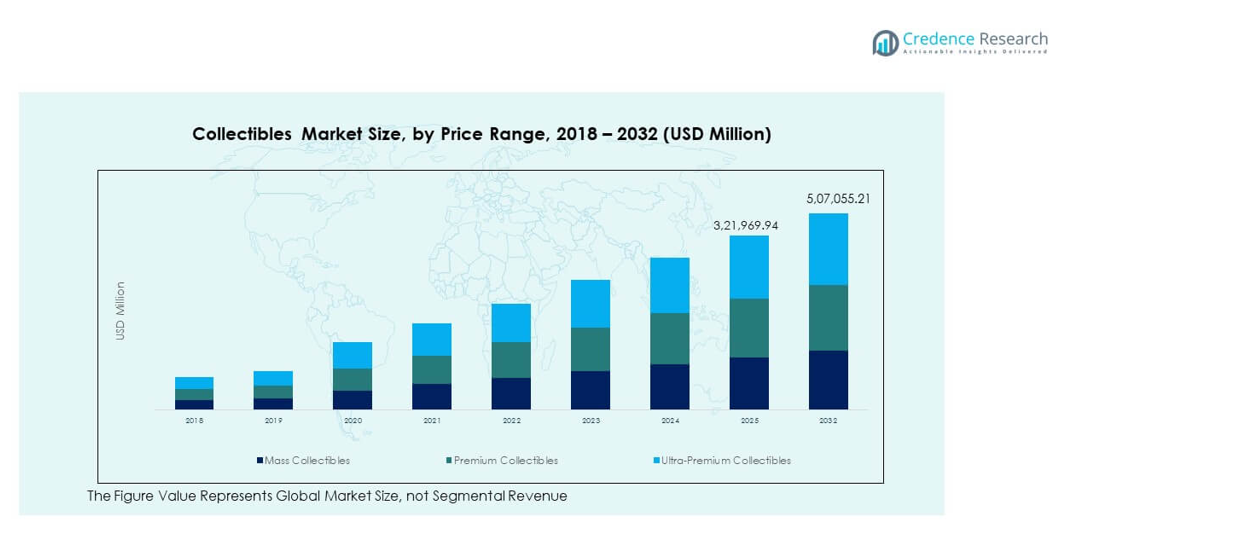CHAPTER NO. 1: GENESIS OF THE MARKET
1.1 Market Prelude – Introduction & Scope
1.2 The Big Picture – Objectives & Vision
1.3 Strategic Edge – Unique Value Proposition
1.4 Stakeholder Compass – Key Beneficiaries
CHAPTER NO. 2: EXECUTIVE LENS
2.1 Pulse of the Industry – Market Snapshot
2.2 Growth Arc – Revenue Projections (USD Million)
2.3. Premium Insights – Based on Primary Interviews
CHAPTER NO. 3: COLLECTIBLES MARKET FORCES & INDUSTRY PULSE
3.1 Foundations of Change – Market Overview
3.2 Catalysts of Expansion – Key Market Drivers
3.2.1 Momentum Boosters – Growth Triggers
3.2.2 Innovation Fuel – Disruptive Technologies
3.3 Headwinds & Crosswinds – Market Restraints
3.3.1 Regulatory Tides – Compliance Challenges
3.3.2 Economic Frictions – Inflationary Pressures
3.4 Untapped Horizons – Growth Potential & Opportunities
3.5 Strategic Navigation – Industry Frameworks
3.5.1 Market Equilibrium – Porter’s Five Forces
3.5.2 Ecosystem Dynamics – Value Chain Analysis
3.5.3 Macro Forces – PESTEL Breakdown
3.6 Price Trend Analysis
3.6.1 Regional Price Trend
3.6.2 Price Trend by product
CHAPTER NO. 4: KEY INVESTMENT EPICENTER
4.1 Regional Goldmines – High-Growth Geographies
4.2 Product Frontiers – Lucrative Product Categories
4.3 Category Sweet Spots – Emerging Demand Segments
CHAPTER NO. 5: REVENUE TRAJECTORY & WEALTH MAPPING
5.1 Momentum Metrics – Forecast & Growth Curves
5.2 Regional Revenue Footprint – Market Share Insights
5.3 Segmental Wealth Flow – Type & Category Revenue
CHAPTER NO. 6: TRADE & COMMERCE ANALYSIS
6.1.Import Analysis by Region
6.1.1. Global Collectibles Market Import Revenue By Region
6.2.Export Analysis by Region
6.2.1. Global Collectibles Market Export Revenue By Region
CHAPTER NO. 7: COMPETITION ANALYSIS
7.1.Company Market Share Analysis
7.1.1. Global Collectibles Market: Company Market Share
7.2. Global Collectibles Market Company Revenue Market Share
7.3.Strategic Developments
7.3.1.Acquisitions & Mergers
7.3.2. New Product Launch
7.3.3. Regional Expansion
7.4. Competitive Dashboard
7.5. Company Assessment Metrics, 2024
CHAPTER NO. 8: COLLECTIBLES MARKET – BY TYPE SEGMENT ANALYSIS
8.1.Collectibles Market Overview by Type Segment
8.1.1. Collectibles Market Revenue Share By Type
8.2. Ancient
8.3. Vintage
8.4. Modern
8.5. Contemporary
CHAPTER NO. 9: COLLECTIBLES MARKET – BY CATEGORY SEGMENT ANALYSIS
9.1.Collectibles Market Overview by Category Segment
9.1.1. Collectibles Market Revenue Share By Category
9.2. Art & Antiques
9.3. Numismatics
9.4. Philately/Stamps
9.5. Toys & Action Figures
9.6. Comic & Graphic Novels
9.7. Trading Cards
9.8. Memorabilia
9.9. Others
CHAPTER NO. 10: COLLECTIBLES MARKET – BY DISTRIBUTION CHANNEL SEGMENT ANALYSIS
10.1.Collectibles Market Overview by Distribution Channel Segment
10.1.1. Collectibles Market Revenue Share By Distribution Channel
10.2. Online Platforms
10.3. Auction Houses
10.4. Retail Stores
10.5. Specialty Collectible Shops
10.6. Direct Sales
10.7. Trade Shows & Exhibitions
10.8. Private Sales & Negotiations
CHAPTER NO. 11: COLLECTIBLES MARKET – REGIONAL ANALYSIS
11.1.Collectibles Market Overview by Region Segment
11.1.1. Global Collectibles Market Revenue Share By Region
11.1.2.Regions
11.1.3.Global Collectibles Market Revenue By Region
11.1.4. Type
11.1.5.Global Collectibles Market Revenue By Type
11.1.6.Category
11.1.7. Global Collectibles Market Revenue By Category
11.1.8. Distribution Channel
11.1.9. Global Collectibles Market Revenue By Distribution Channel
CHAPTER NO. 12: NORTH AMERICA COLLECTIBLES MARKET – COUNTRY ANALYSIS
12.1.North America Collectibles Market Overview by Country Segment
12.1.1.North America Collectibles Market Revenue Share By Region
12.2.North America
12.2.1.North America Collectibles Market Revenue By Country
12.2.2.Type
12.2.3.North America Collectibles Market Revenue By Type
12.2.4.Category
12.2.5.North America Collectibles Market Revenue By Category
12.2.6.Distribution Channel
12.2.7.North America Collectibles Market Revenue By Distribution Channel
2.3.U.S.
12.4.Canada
12.5.Mexico
CHAPTER NO. 13: EUROPE COLLECTIBLES MARKET – COUNTRY ANALYSIS
13.1. Europe Collectibles Market Overview by Country Segment
13.1.1. Europe Collectibles Market Revenue Share By Region
13.2.Europe
13.2.1.Europe Collectibles Market Revenue By Country
13.2.2.Type
13.2.3.Europe Collectibles Market Revenue By Type
13.2.4.Category
13.2.5. Europe Collectibles Market Revenue By Category
13.2.6.Distribution Channel
13.2.7. Europe Collectibles Market Revenue By Distribution Channel
13.3.UK
13.4.France
13.5.Germany
13.6.Italy
13.7.Spain
13.8.Russia
13.9. Rest of Europe
CHAPTER NO. 14: ASIA PACIFIC COLLECTIBLES MARKET – COUNTRY ANALYSIS
14.1.Asia Pacific Collectibles Market Overview by Country Segment
14.1.1.Asia Pacific Collectibles Market Revenue Share By Region
14.2.Asia Pacific
14.2.1. Asia Pacific Collectibles Market Revenue By Country
14.2.2.Type
14.2.3.Asia Pacific Collectibles Market Revenue By Type
14.2.4.Category
14.2.5.Asia Pacific Collectibles Market Revenue By Category
14.2.5.Distribution Channel
14.2.7.Asia Pacific Collectibles Market Revenue By Distribution Channel
14.3.China
14.4.Japan
14.5.South Korea
14.6.India
14.7.Australia
14.8.Southeast Asia
14.9. Rest of Asia Pacific
CHAPTER NO. 15: LATIN AMERICA COLLECTIBLES MARKET – COUNTRY ANALYSIS
15.1.Latin America Collectibles Market Overview by Country Segment
15.1.1.Latin America Collectibles Market Revenue Share By Region
15.2. Latin America
15.2.1. Latin America Collectibles Market Revenue By Country
15.2.2.Type
15.2.3. Latin America Collectibles Market Revenue By Type
15.2.4.Category
15.2.5.Latin America Collectibles Market Revenue By Category
15.2.6.Distribution Channel
15.2.7.Latin America Collectibles Market Revenue By Distribution Channel
15.3.Brazil
15.4.Argentina
15.5.Rest of Latin America
CHAPTER NO. 16: MIDDLE EAST COLLECTIBLES MARKET – COUNTRY ANALYSIS
16.1.Middle East Collectibles Market Overview by Country Segment
16.1.1.Middle East Collectibles Market Revenue Share By Region
16.2.Middle East
16.2.1. Middle East Collectibles Market Revenue By Country
16.2.2.Type
16.2.3.Middle East Collectibles Market Revenue By Type
16.2.4.Category
16.2.5.Middle East Collectibles Market Revenue By Category
16.2.6. Distribution Channel
16.2.7.Middle East Collectibles Market Revenue By Distribution Channel
16.3.GCC Countries
16.4. Israel
16.5. Turkey
16.6.Rest of Middle East
CHAPTER NO. 17: AFRICA COLLECTIBLES MARKET – COUNTRY ANALYSIS
17.1. Africa Collectibles Market Overview by Country Segment
17.1.1.Africa Collectibles Market Revenue Share By Region
17.2. Africa
17.2.1.Africa Collectibles Market Revenue By Country
17.2.2.Type
17.2.3.Africa Collectibles Market Revenue By Type
17.2.4.Category
17.2.5. Africa Collectibles Market Revenue By Category
17.2.6.Distribution Channel
17.2.7. Africa Collectibles Market Revenue By Distribution Channel
17.3. South Africa
17.4.Egypt
17.5.Rest of Africa
CHAPTER NO. 18: COMPANY PROFILES
18.1. Heritage Auctions, Inc.
18.1.1.Company Overview
18.1.2.Product Portfolio
18.1.3.Financial Overview
18.1.4.Recent Developments
18.1.5.Growth Strategy
18.1.6.SWOT Analysis
18.2. Hasbro, Inc.
18.3. Christie’s International plc
18.4. Sotheby’s
18.5. Hake’s Americana & Collectibles, Inc.
18.6. Lelands, Inc.
18.7. ComicLink Corporation
18.8. The Upper Deck Company, LLC
18.9. Stanley Gibbons Group plc.
18.10. Funco






